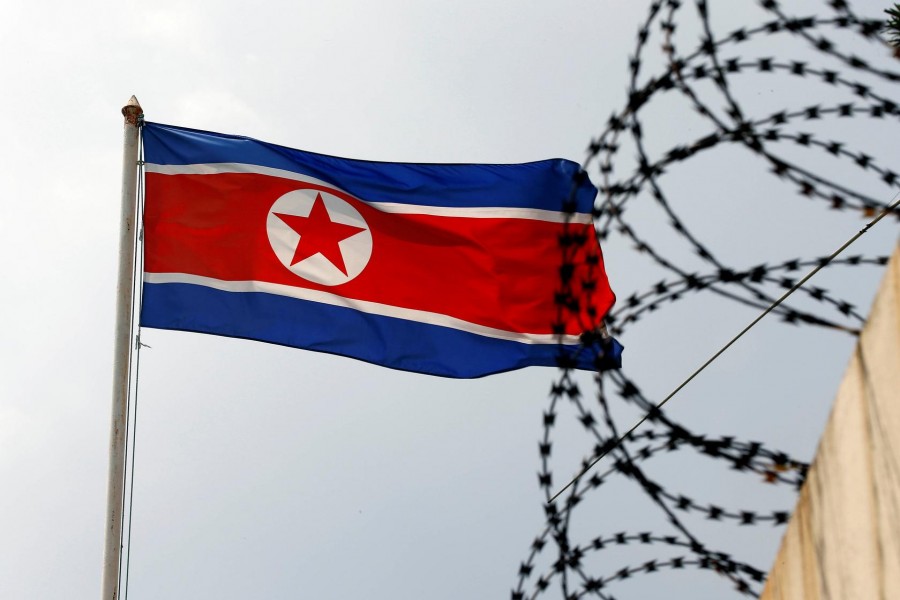North Korea appeared to test fire a ballistic missile on Tuesday for the second time in less than a week, drawing condemnation from South Korea and Japan where officials said the repeated launches risked destabilising the region.
The suspected ballistic missile launch was detected around 7:27 a.m. (2227 GMT) from an inland area of North Korea toward the ocean off its east coast, South Korea's Joint Chiefs of Staff (JCS) said in a statement.
South Korea's National Security Council held an emergency meeting and expressed "strong regret" that the missile test came at a time when regional stability is extremely important, reports Reuters.
"Members of the NSC urged North Korea to swiftly respond to the international community's expectations for peace and stability on the Korean peninsula, and agree to resume dialogue and cooperation," the presidential Blue House said in a statement.
Coming after nuclear-armed North Korea claimed to have tested a hypersonic missile on Wednesday, the launch underscored leader Kim Jong Un's New Year's vow to bolster the military at a time when talks with South Korea and the United States have stalled.
Japan's defence ministry said that if the projectile followed a normal trajectory for ballistic missiles it would have flown less than 700 km (435 miles), similar to recent tests of short-range ballistic missiles by North Korea.
The South Korean military said it was cooperating with its US allies and closely monitoring the situation in preparation for additional launches.
Leif-Eric Easley, a professor of international studies at Seoul's Ewha University said North Korea is attempting to use repeated tests to normalise its missile capabilities, portraying itself as a country engaged in incremental improvements for self-defence.
"At the same time, Pyongyang is challenging international sanctions, testing what it can get away with while the United Nations Security Council remains divided," he said.
'SIGNIFICANT THREAT'
Japanese Prime Minister Fumio Kishida noted the United Nations had just finished holding discussions on how to respond to last week's launch.
"That North Korea continues to launch missiles is extremely regrettable," he told reporters.
Tuesday's apparent launch came a day after the United States mission to the United Nations, joined by France, Ireland, Japan, the United Kingdom and Albania, issued a joint statement condemning last week's test.
"These actions increase the risk of miscalculation and escalation and pose a significant threat to regional stability," US Ambassador Linda Thomas-Greenfield said in the statement on Monday. Such tests not only improve the North's capabilities, but expands what it can offer illicit arms clients and dealers around the world, she added.
"(North Korea) makes these military investments at the expense of the well-being of the North Korean people," she said.
UN Security Council resolutions ban all ballistic missile and nuclear tests by North Korea, and have imposed sanctions over the programmes.
However, China and Russia are pushing the UN Security Council to ease sanctions on North Korea by removing a ban on Pyongyang's exports of statues, seafood and textiles, and lifting a refined petroleum imports cap.
Thomas-Greenfield reiterated calls for countries around the world to enforce sanctions, and for North Korea to return to talks and abandon its missiles and nuclear weapons.
"Our goal remains the complete, verifiable, and irreversible denuclearisation of the Korean Peninsula," she said.
The US State Department did not immediately respond to a request for comment on Tuesday's launch.
North Korea has said it is open to talk, but only if the United States and others drop "hostile policies" such as sanctions and military drills.
Few observers expect Kim to ever fully surrender his nuclear arsenal and North Korea argues its missile tests and other military activities are for self-defence.
Last week, South Korean military officials cast doubts on the capabilities of the "hypersonic missile" North Korea claimed to have test fired on Wednesday, saying it appeared to represent limited progress over Pyongyang's existing ballistic missiles.
"Today's test might be intended to send a message to the South after authorities here said the earlier test was a failure and did not involve a hypersonic missile," Kim Dong-yup, a former South Korea Navy officer who now teaches at Seoul's Kyungnam University.


